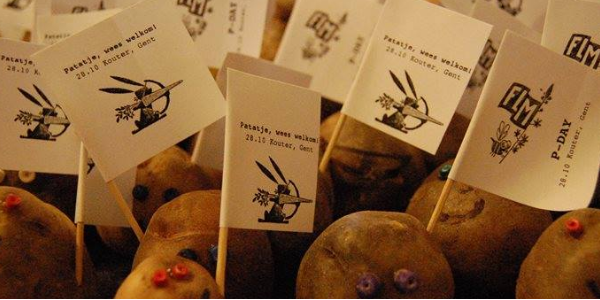أداء: تحرير العلوم Lecture Performance Liberate the Sciences

-
التاريخ11 - Sep 2018
-
الساعة19:30 - 21:00
-
العنوانKhalil Sakakini Cultural Center مركز خليل السكاكيني الثقافي, المصيون, رام الله والبيرة
-
مشاهدة1308
**English Follows**
لماذا تعتبر القصص التي يتم إعدادها في الجامعات "حقيقية" أكثر من تلك التي يتم إجراؤها في حقول المزارعين؟ منذ متى يعرف الباحثون عن الزراعة أكثر من الفلاحين؟ كيف تمنع العلم الحديث من تدمير المعرفة ومستقبل الأطفال؟
هذه نزهة تجول في حقل بحثاً عن معنى ...
نحن سعداء في مركز خليل السكاكيني الثقافي وضمن برامج الأرض أن يتسنى لنا دعوتكم لحضور المحاضرة الأدائية "تحرير العلوم" التي تقدمها الباحثة باربرا ڤان دايك. وذلك يوم الثلاثاء 11 / 9/ 2018 علي الساعة السابعة والنصف مساء في حديقة المركز.
يتبع المحاضرة الأدائية التي تستكشف جدلاً حول البطاطا المعدلة وراثياً في بلجيكا مناقشة تسأل "أي بحث (زراعي) لأي مستقبل؟"
ستكون المحاضرة باللغة الانجليزية.
كما يمكنكم التبرع ب 10 شيكل تذهب لدعم وجود المركز ونشاطاته.
عن المحاضرة:
في حين أن البحوث الزراعية، والعلوم على نطاق أوسع، قد لا تشكل مصدر قلق كبير لمعظم الناس، فإن هذه المحاضرة الأدائية تدعي أن عمل العلماء هو عمل الجميع. تبدأ "تحرير العلوم" من تجربة شخصية وتستكشف من خلال رواية القصص والحركة والفيديو والأصوات والمسرح وإلقاء المحاضرات عن العلاقة الوثيقة بين البحث والبيئة والسياسة والمصالح الاقتصادية.
قصة "تحرير العلوم" هي قصة بطاطا معدلة وراثياً، وجامعات، ونشاط سياسي يوسع نطاق الأسئلة التقنية الضيقة في المسائل السياسية العميقة. من الذي يشارك في تطوير البطاطا المعدلة وراثيا؟ ما هي وجهات النظر العالمية التي تنطوي عليها هذه الابتكارات؟ هذه المعرفة تهم من؟ وكيف يمكن توفير مساحة لتقييم الأصوات والمعارف والخبرات المختلفة في تشكيل مستقبل الغذاء والزراعة؟
باربرا فان دايك ناشطة في مجال الغذاء من بلجيكا وباحثة في جامعة ساسكس. وهي تعمل على العلوم في مسائل المجتمع مع اهتمام خاص في الإيكولوجيا السياسية للزراعة والأغذية. كونها متدربة، وناقدة لتعليمها كمهندسة في علوم الحياة، فإنها تشعر بالفضول بشكل خاص حول طرق استجواب العالم بطرق تتجاوز الحدود فروع المعرفة والمؤسساتية.
*******
Why are stories made in universities more "true" than those made in the farmers’ fields? Since when do researchers know more about agriculture than peasants? How to prevent modern science from destroying knowledge and children's future? A wandering walk in a field in search of meaning ...
We are delighted at KSCC and as part of the Land Program to have the chance to invite you the lecture performance "Liberate the Sciences" by Barbara Van Dyck, which will take place the KSCC garden on Tuesday 11 / 9/ 2018 ay 7:30pm.
The lecture performance which explores a controversy around genetically manipulated potatoes in Belgium will be followed by a discussion exploring ‘which (agricultural) research for what futures?’
The lecture will be in English language.
suggested donation: 10nis goes to support the existence of the centre and its activities.
About the lecture:
Whereas agricultural research, and science more broadly, may seem of no great concern to most people, the ‘lecture performance’ claims that the work of scientists is everybody’s business. “Liberate the Sciences” starts from a personal experience and explores through storytelling, movement, video, sounds, theatre and lecturing how research, the environment, politics and economic interests are intimately related.
“Liberate the Sciences” is a story of genetically manipulated potatoes, universities and activism that broadens seemingly narrow technical questions into deeply political ones. Who is involved in the development of genetically modified potatoes? What world views are implied in these innovations? Whose knowledge counts? And how to make space for valuing different voices, knowledges and experiences in shaping the future of food and agriculture?
Barbara Van Dyck is a food activist from Belgium and a researcher at the University of Sussex. She works on science in society questions with a particular interest in the political ecologies of agriculture and food. Being trained, and critical towards her education as an engineer in the life sciences, she is particularly curious about the methods of questioning the world in ways that go beyond disciplinary and institutional boundaries.